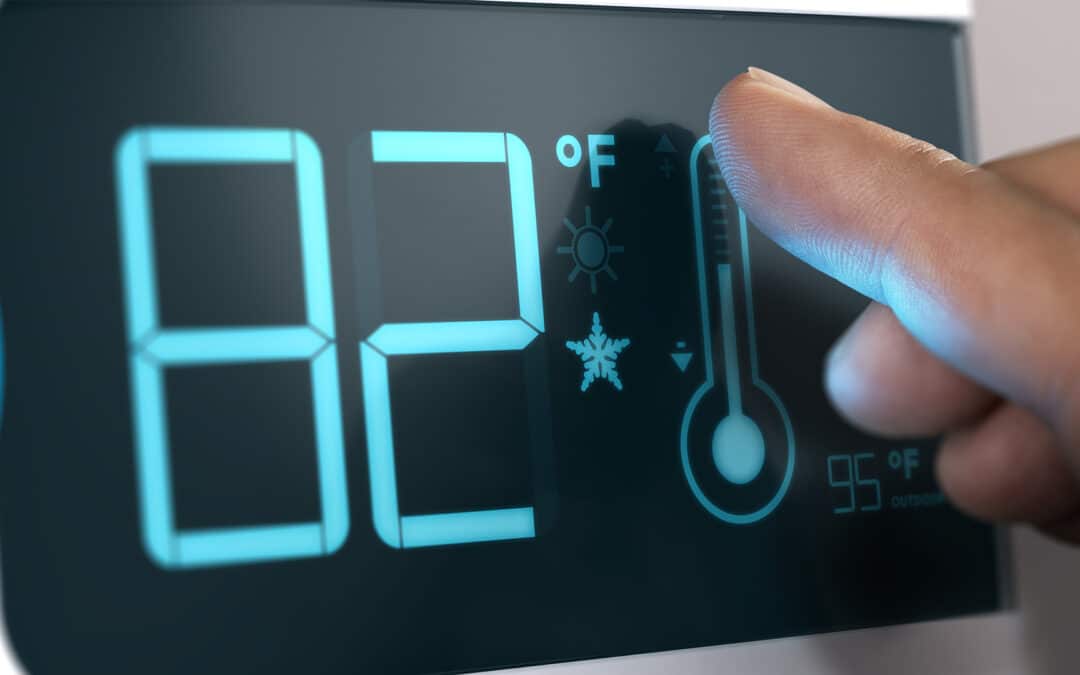Rising energy costs in recent years have led many homeowners to look for ways to reduce their heating and cooling bills. Reducing energy consumption not only reduces costs, but also has a positive impact on the environment. Indeed, energy production is often associated with the emission of greenhouse gases, which contributes to global warming. With this in mind, this article offers 10 simple tips to reduce your air conditioning and heating energy bills, while having a positive impact on the environment. By following these tips, you can save money while reducing your carbon footprint.
Know your heating and cooling system: Crucial step to save energy
Before you start looking for energy-saving tips, it’s essential to understand how your heating and cooling system works. By knowing the particularities of your system, you will be able to optimize its use and reduce your energy bills.
The first thing to consider is the age of your system. Older systems are often less energy efficient than newer systems. If your system is more than 10 years old, it may be a good idea to replace it with a newer, more energy-efficient model.
It’s also important to know how your heating and cooling system works. Forced-air systems are different from hot water heating systems, and central air conditioning systems are different from window air conditioning systems. Understanding the specifics of your system can help you optimize its use.
In addition, it is important to know how to properly adjust your thermostat. A poorly adjusted thermostat can waste a lot of energy. To save energy, set your thermostat to the lowest possible temperature in winter and to the highest possible temperature in summer, while remaining comfortable. You can also invest in a programmable thermostat to automatically adjust the temperature according to your daily schedules.
By knowing your heating and cooling system, you will be able to make the right decisions to save energy and reduce your bills.
Programming Your Thermostat: A Simple Trick to Save Money
The thermostat is a very handy tool to control the temperature of your home. By programming it correctly, you can save a lot of money on your heating and cooling bills. Here are some tips to help you program your thermostat:
- Understanding your heating and cooling system: The first step in programming your thermostat is to understand how your heating and cooling system works. You need to know how your system is set up and how it uses power. By understanding these elements, you will be able to adjust the thermostat optimally.
- Choosing the right thermostat: There are several types of thermostats on the market. Some are more complex than others and can be programmed more precisely. Make sure you choose a thermostat that suits your system and needs.
- Program your thermostat according to your habits: Program your thermostat according to your habits. If you are away during the day, set it to lower the temperature in your absence. Similarly, if you are often at home in the evening, set it so that the temperature is higher at that time.
- Do not change settings frequently: Once you have programmed your thermostat, avoid changing settings frequently. This can lead to unnecessary energy consumption and higher bills.
- Use pre-set schedules: Many thermostats come with pre-set schedules for different times of the day. Use them to save energy and reduce your bills.
- Use smart thermostats: Smart thermostats can be programmed remotely using a mobile app. This can be very handy if you need to adjust the temperature of your home when you’re on the go.
- Install zoned thermostats: If you have multiple zones in your home, installing zoned thermostats can be a great solution to save energy. This allows you to control the temperature of each zone individually, which can significantly reduce your energy consumption.
Using these tips, you can program your thermostat to save energy and reduce your heating and cooling bills. The thermostat is a simple, yet powerful, tool to save money on your energy bills.
Use curtains, blinds or shutters to block heat or cold
Curtains, blinds and shutters are useful accessories to reduce your energy consumption by blocking heat or cold. When temperatures are high, close your curtains, blinds or shutters during the day to prevent outside heat from entering your home. Similarly, when temperatures are low, close them at night to prevent heat from escaping.
Thick curtains or insulating shutters can be particularly effective in preventing the ingress of heat or cold. You can also invest in low-e or solar-reflective window films to reduce heat transmission.
Using curtains, blinds or shutters can not only help you save energy, but also enhance the aesthetics of your home by adding a touch of style. Curtains come in a variety of colors and patterns, so you can choose the ones that best suit your décor.
In summary, using curtains, blinds or shutters to block heat or cold is a simple but effective trick to save money on your energy bills.
Regularly maintain your heating and cooling system: A preventive solution to save energy
Poorly maintained systems consume more energy to operate, which increases your energy bills. Therefore, it is important to follow a regular maintenance schedule for your heating and cooling system.
The air filter in your air conditioning and heating system should be replaced or cleaned regularly. Dirty filters clog airflow, forcing your system to work harder to heat or cool your home, increasing your energy consumption. You can check your air filter monthly and clean or replace it if necessary.
In addition, air conditioning and heating systems also require regular professional maintenance to ensure their proper functioning. An air conditioning and heating technician can perform a complete maintenance on your system, including checking electrical connections and pipes, lubricating moving parts, and checking refrigerant levels. By performing regular maintenance, you can extend the life of your system and avoid costly repairs.
Finally, don’t forget to regularly clean the ducts of your heating and cooling system. Dirty ducts can obstruct airflow, reducing the efficiency of your system. You can clean the ducts yourself with a vacuum cleaner or hire a professional to perform the cleaning.
In summary, regular maintenance of your heating and cooling system is crucial to saving energy and reducing your energy bills. By following these simple tips, you can extend the life of your system, improve its efficiency, and save money on your energy bills.
Sealing Air Leaks: An Inexpensive Solution to Save Energy
Air leaks are one of the main drivers of energy waste in homes. Air leakage can occur around doors and windows, in ceilings, walls and floors. Locating and sealing these leaks is important to save energy and reduce your heating and cooling bills.
The first step is to locate air leaks. You can easily do this by lighting a candle and placing it near windows, doors, electrical outlets, switches and ducts. If the flame of the candle flickers, it means that there is an air leak. You can also use an air leak detector to locate air leaks.
Once you have located the air leaks, you can seal them using caulking, tape or beads. Air leaks around doors can be sealed by installing door seals or adding door flanges. Air leaks around windows can be sealed using caulking or window tape.
You can also seal air leaks in ceilings, walls and floors using insulation. Insulation can be blown into walls and ceilings to fill empty spaces and seal air leakage. Floors can be insulated using insulation boards.
Sealing air leaks is an inexpensive solution to save energy. Sealing materials can be purchased at any DIY store and are cheap. In addition, sealing air leaks can reduce your heating and cooling bills by 10-20%.
Installing ceiling fans: A simple trick to save energy
Installing ceiling fans is a simple and inexpensive trick to save energy. These devices help reduce the ambient temperature by creating a movement of fresh air in the room. They are particularly effective in areas with high humidity.
Ceiling fans do not replace air conditioners or heaters, but they can help reduce their use. In summer, they lower the temperature of the room by about 4 degrees Celsius, which makes it possible to set the air conditioning to a higher temperature while maintaining satisfactory thermal comfort. In winter, they can be used to circulate warm air that accumulates near the ceiling, allowing heat to be distributed more evenly throughout the room and improving thermal comfort.
For best results, it is important to install ceiling fans correctly. It is recommended to install them at a height of 2.50 to 3 meters for maximum efficiency. It is also important to clean them regularly to avoid dust build-up that can reduce their effectiveness.
Ceiling fans are available in a wide variety of styles and sizes to suit any taste and room. They can be equipped with built-in lighting for additional functionality.
Finally, ceiling fans are an environmentally friendly and energy-efficient solution. They consume much less energy than air conditioners and heaters and are therefore a sustainable alternative to maintain a comfortable temperature in your home.
Choosing the right filters for your air conditioning system: A key factor in saving energy
Choosing filters for your air conditioning system may seem like a simple and unimportant task, but it can have a significant impact on your system’s energy consumption. This is because filters prevent dust particles, pollutants and other impurities from entering your air conditioning system. If the filters are dirty or clogged, it reduces airflow, which increases the energy consumption of your system.
It is important to choose the right filters for your air conditioning system. Filters are classified according to their efficiency, measured by the size of the particles they can trap. The most efficient filters have a MERV (Minimum Efficiency Reporting Value) rating of 13 to 16, which means they can trap particles as small as 0.3 microns. However, these filters are also thicker and can reduce airflow in your air conditioning system, increasing energy consumption.
To save energy, it is recommended to use filters with a MERV rating of 7 to 12. These filters are thinner and allow for better air circulation, reducing the energy consumption of your air conditioning system. However, they are less effective at trapping fine particles and may require more frequent replacement.
It is also important to regularly replace the filters in your air conditioning system. Dirty or clogged filters can reduce airflow, increasing the energy consumption of your air conditioning system. It is recommended to replace filters every 1-3 months, depending on the use of your air conditioning system and the air quality in your area.
In conclusion, choosing the right filters for your air conditioning system and replacing them regularly is a key factor in saving energy. By using filters with a MERV rating of 7 to 12, you can reduce the energy consumption of your air conditioning system while ensuring sufficient air circulation.
Keeping Your Ventilation Ducts Clean: Another Energy-Saving Tip
Another important tip for saving energy and reducing your cooling and heating bills is to keep your ventilation ducts clean. Dirty and clogged ventilation ducts can impede airflow, which can make your air conditioning and heating system less efficient.
Dirt, dust, debris and mold can accumulate in ventilation ducts over time. This can not only affect indoor air quality, but it can also increase your energy consumption, as your system will have to work harder to maintain a comfortable temperature.
It is recommended to have your ventilation ducts cleaned every 3 to 5 years. If you have pets, smoke indoors, or live in an area where there is a lot of pollution, you should consider having your ventilation ducts cleaned more often.
If you decide to clean your ventilation ducts, it is important to hire a qualified professional to do so. Professionals will use special tools to remove dirt and debris, and they can also inspect your ventilation ducts for leaks.
In addition to cleaning your ventilation ducts, it’s also important to regularly replace the air filters in your air conditioning and heating system. Clogged air filters can lead to reduced airflow and increased energy consumption, which can increase your energy bills.
By keeping your ventilation ducts clean and replacing air filters regularly, you can improve the efficiency of your air conditioning and heating system and save money on your energy bills.
Using Common Sense: Simple Habits to Save Energy
In addition to technical and material tips, there are simple habits that everyone can adopt to save energy and reduce their heating and cooling bills. These habits have a significant impact on energy consumption and the environment.
First, it is important to close doors and windows in unused rooms to prevent heat or cold from escaping. Another tip is not to heat or cool unused rooms, such as garages or attics.
In addition, it is advisable to use blankets and warm clothes during the winter months rather than overheating the house. Similarly, in summer it is better to wear light clothes and turn down the air conditioning.
Finally, it’s important to use common sense by turning off lights and electronics when not in use, using LED or energy-saving bulbs, and avoiding using energy-intensive electrical appliances like clothes dryers.
By adopting these simple habits, you can save energy and significantly reduce your heating and cooling bills. In addition, it helps to reduce the environmental impact of your energy consumption.
Installing an Energy-Efficient Heating and Cooling System: A Long-Term Solution to Save Money
Installing an energy-efficient heating and cooling system is a long-term solution to save money on your energy bills. While this may seem like an expensive option in the short term, the savings you’ll make in the long run will be considerable.
Modern heating and cooling systems are designed to be more energy efficient, meaning they consume less energy to produce the same amount of heat or coolness as older systems. Modern systems are also more efficient, meaning they can heat or cool your home faster and more efficiently than older systems.
When considering installing a new heating and cooling system, there are several factors to consider. First, you need to consider the size of your home and how many rooms you want to heat or cool. You also need to consider the location of your home and the climate you live in.
There are several types of energy-efficient heating and cooling systems you can choose from, such as ground-source heat pumps, solar systems, energy-efficient boilers, energy-efficient air conditioners and much more. Energy-efficient heating and cooling systems are often equipped with features like programmable thermostats, motion sensors, and variable speed fans to help you save energy.
Finally, it is important to hire a qualified professional to install your new heating and cooling system. A qualified professional will be able to help you choose the system that best suits your home and budget, as well as ensure a correct and efficient installation. Ultimately, installing a new, energy-efficient heating and cooling system can help you save money in the long run, while reducing your impact on the environment.
Conclusion: Practical tips to reduce your cooling and heating energy bills
By following these practical tips, you can significantly reduce your heating and cooling energy bills. It’s important to remember that every little change counts, and by adopting good habits, you can save money while reducing your carbon footprint.
It is recommended to start with the simplest and inexpensive measures, such as sealing air leaks, using curtains and blinds to block heat and cold, and installing ceiling fans. These measures can significantly reduce the amount of energy needed to maintain a comfortable temperature in your home.
It’s also important to maintain your heating and cooling system regularly, replacing filters and keeping ducts clean. By choosing the right filters for your air conditioning system, you can increase its efficiency and save energy.
Finally, if you’re considering a long-term solution, installing an energy-efficient heating and cooling system can be a great option. While this may require a larger upfront investment, it can save you money in the long run by reducing your energy bills.
In short, there are many simple and inexpensive tricks to save energy when it comes to heating and cooling. By following these practical tips, you can not only save money, but also reduce your impact on the environment.


